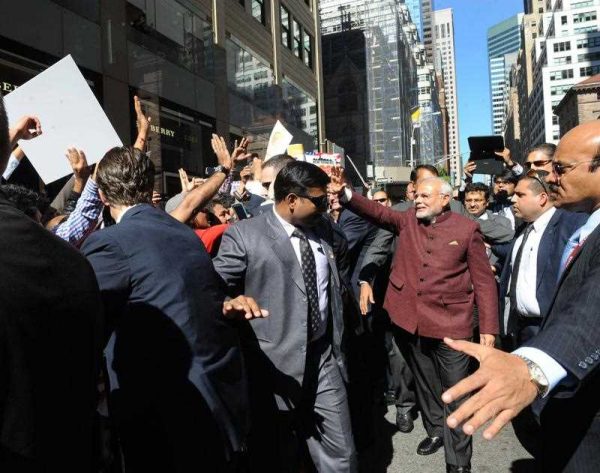In an extensive interview with CNN on the eve of his visit, Modi held forth on a range of issues, ranging from terrorism and the challenge of radical ideologies to the rise of China. Some of these themes will be elucidated in greater detail as the trip progresses.
Modi will be able to project his impressive political profile in New York. Billed as a major public event with an estimated crowd of almost 20,000 people, it will draw many of the Indian diaspora. In keeping with his ability to harness communication technology effectively the event will also be live streamed to other cities in the US and India. It is not often that a foreign leader is able to attract such large numbers at a public event and the sub-text of the relevance of the Indian diaspora in domestic US politics is discernible — albeit in a subtle manner. Politics is the art of managing spectacle and the Modi visit did not disappoint. But the Washington part of the Modi visit will be more sober than the General Assembly speech. Politically, the real contrast will be between a confident Indian prime minister and a beleaguered US president.
Until recently the US had denied a visa to Narendra Modi — then chief minister of Gujarat — and it was only after his emphatic electoral victory that Washington reviewed this imprudent decision. To his credit, Modi — who cannot be accused of a poor memory — has not appeared to have allowed this issue to mar his perception of the US. Modi will have a wide range of issues that he wishes to discuss. The India–US bilateral relationship has been moribund since 2008 due to the global economic downturn and the domestic political constraints associated with the Manmohan Singh government in its second term (2009–14).
The US may not be able to make any large fiscal commitment to Modi, as Japan’s Prime Minister Shinzo Abe and to an extent China’s President Xi Jinping have been able to during their recent meetings with Modi. However, given the size of the US economy and the complementarities with India, the Obama–Modi meeting may yield fruit on the issues of trade and technology transfers. Indian red-tape and complex bureaucratic procedures do not make India an attractive business destination and it remains to be seen how Modi will be able to convince his interlocutors, both US corporate and political leaders, that India is now moving from ‘red tape to red carpet’, as Modi put it in Tokyo.
In light of the recent visit of President Xi to India and the manner in which PLA troops flexed their muscle, enhancing India’s comprehensive military capability will figure high on Modi’s agenda. India and the US signed a comprehensive defence cooperation agreement in June 2005 but it has remained on the backburner for almost a decade. The recent visit of US Secretary of Defense Chuck Hagel to Delhi drew attention to the considerable potential that this sector offers. With luck, the Modi–Obama meeting will infuse much-needed political traction into this aspect of the bilateral relationship.
Regional and global security issues such as the future status of Afghanistan, the turmoil in Pakistan and the threat posed by terrorist groups like al-Qaeda and Islamic State will figure, but it is unlikely that there will be any consensus given the divergent views that Delhi and the White House have had about the role of Pakistan’s military and its links with terrorist groups.
Perhaps the one area where the two leaders will have a relatively candid conversation is about managing the assertiveness of China, particularly in relation to territoriality. Will China abide by international law and customary practice in the South China Sea, for example?
The relationship between India and United States has great potential, and the meeting between Obama and Modi could very well herald the start of a more productive bilateral relationship.
C Uday Bhaskar is Director of the Society for Policy Studies, New Delhi.

